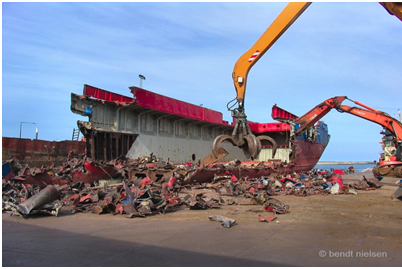
International shipping
organisation BIMCO has submitted a paper highlighting the need to solve possible conflicting requirements of the Hong Kong
Convention and the Basel Convention which could have
severe consequences for shipowners, ship recycling facilities, and ships.
BIMCO, along with Bangladesh,
India, Norway, Pakistan, and the International Chamber of Shipping, sent the
paper ahead of the 81st Marine Environment Protection Committee (MEPC) meeting
set to be held March 18-22, 2024.
The Hong Kong International Convention for the Safe
and Environmentally Sound Recycling of Ships will enter into force on June 26,
2025. Ahead of its entering
into force, BIMCO and the co-signatories of the paper asked the MEPC of the
International Maritime Organization (IMO) for more legal certainty.
This includes
clarification and assurance that shipowners and parties operating in compliance
with the Hong Kong Convention will not be sanctioned as a violation of the
Basel Convention on the Control of Transboundary Movements of Hazardous Wastes
and their Disposal.
In some jurisdictions, contravention of the Basel
Convention, as applied to ship recycling, has resulted in sanctions against
shipowners and masters.
“The ratification of
the Hong Kong Convention marks the beginning of a new era for the ship recycling
industry. We must make sure that legal obstacles and conflicts between the two
conventions governing the safe and sound recycling of ships do not limit the
scope of this historic opportunity,” BIMCO’s secretary-general and CEO David
Loosley said.
One of the
inconsistencies the paper pointed out is related to hazardous waste. Once a
ship has received an International Ready for Recycling Certificate (IRRC) under
the Hong Kong Convention, it may at the same time be considered a hazardous
waste under the provisions of the Basel Convention. During the entire validity
period of the certificate – which is up to three months – the ship could risk
being arrested for breach of the Basel Convention requirements while
trading.
According to BIMCO,
since both conventions can apply to end-of-life ships, shipowners risk
prosecution in cases when the shipowner has sent the ships for safe and
environmentally sound recycling at yards that comply with the Hong Kong
Convention in one of the four major recycling states, namely Bangladesh, India,
Pakistan, and Turkey.
“We and the co-sponsors of this paper welcome and
support the increased transparency and rising standards brought about by the
Hong Kong Convention finally entering into force. It is therefore crucial for the consistent
implementation of the convention to ensure that compliance does not result in
sanctions under the Basel Convention,” Loosley added.